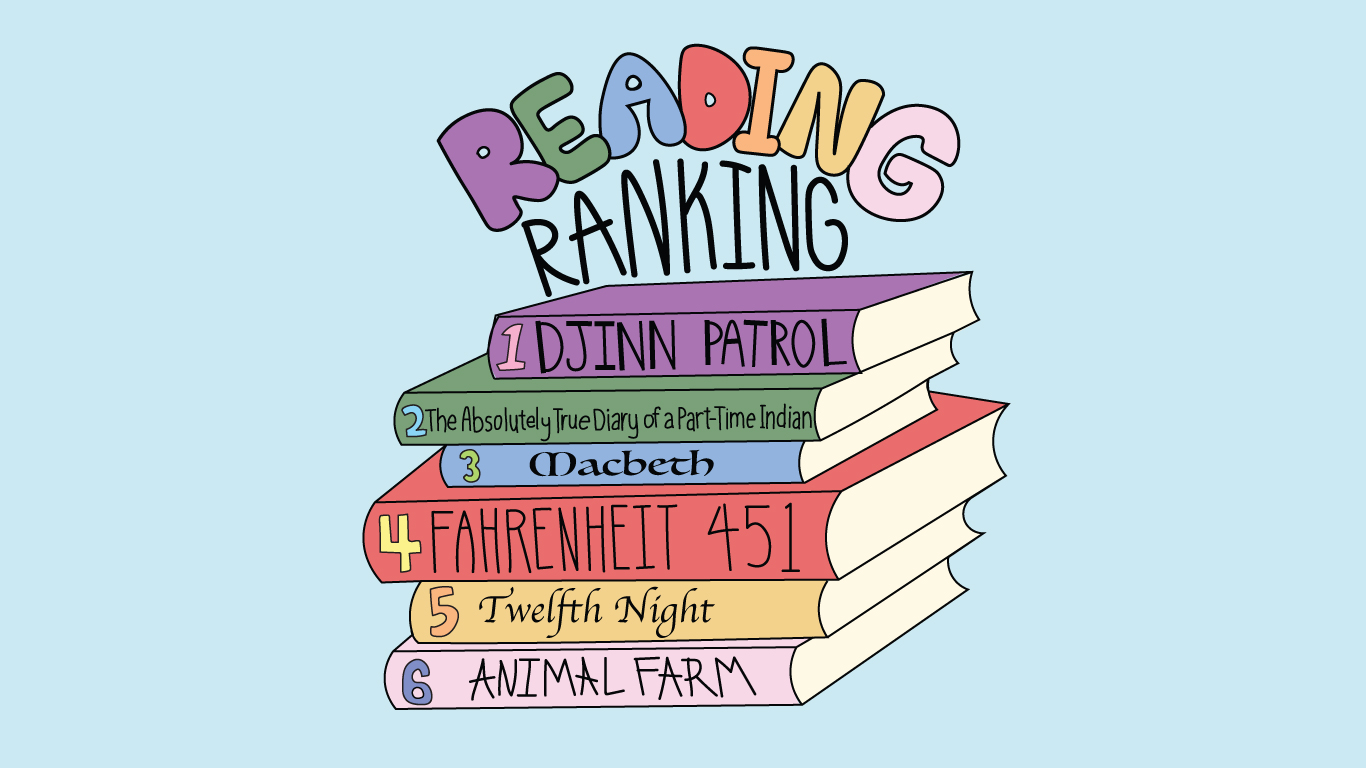Djinn Patrol on the Purple Line
Djinn Patrol on the Purple Line” follows Jai, a young boy living in an Indian basti, an extremely impoverished area, as he investigates the disappearance of local children. Deepa Anappara’s debut novel brims with detail — each chapter is beautifully described and each character is fully fleshed out. Some of the cultural terminology may require Googling, but the lexicon makes the story more realistic. Anappara’s description of the basti and the challenges of poverty are real observations from when she was a journalist in Mumbai and Delhi. The syntax is modern and the story is clear, which makes it an easy read. Reading this in a classroom setting is a pleasant surprise, as it’s a change from the slow classic literature traditionally taught in high school English classes.
The Absolutely True Diary of a Part-Time Indian
In the semi-autobiographical “Absolutely True Diary of a Part-Time Indian,” local author Sherman Alexie details his experiences growing up on the Spokane Indian Reservation. Set in the mid-2000’s, Alexie adopts the identity of a 14-year-old boy nicknamed Junior who uses self-deprecation and irony to cope with his experiences of racism and ableism. The book masterfully covers topics such as poverty, bullying and alcohol use disorder. Comics and small illustrations drawn ‘by Junior’ are also used to ironically depict situations in his life. A young-adult novel, “The Diary of a Part-Time Indian” is easy to read and provides an entertaining view into an often neglected perspective, although the book’s graphic nature caused it to be challenged in middle and high school libraries across the United States.
Macbeth
Written in the early 17th century by William Shakespeare, “The Tragedy of Macbeth” is a short play crammed with excitement. The piece covers political instability and psychological deterioration, and many parts of it are inspired by Greek mythology. It follows titular character Macbeth, who, after receiving a prophecy that says he is destined for the Scottish crown, takes violent action that causes a series of unfortunate events. The political commentary alludes to the state of Europe at the time, though many of its statements still hold true. Due to its age, the grammar is dated and can be hard to read, but there are many modern translations. It holds a special place in the hearts of those with a flair for dramatics.
Fahrenheit 451
Fahrenheit 451” is a prime example of expert world-building and a well-executed dystopia. In the distant future, Guy Montag is a fireman whose job is to burn books, and he meets a new neighbor, Clarisse McClellan, who tells him of a past where firemen fought fires instead of starting them and printed books were legal. Despite being published over 71 years ago, the language is accessible and engaging. The story explores media suppression when government control becomes extreme and takes away personal liberties. Montag is an interesting protagonist with good character development and well-written inner monologues. Reading this in English class is a treat, and the story is especially relevant in this day and age.
Twelfth Night
Shakespeare’s “Twelfth Night” is a rom-com love triangle filled with plot twists. It’s more progressive than other plays of its time, with characters who crossdress and blur boundaries of sexuality. After a shipwreck separates Viola from her twin brother and deserts her and the crew on an island called Illyria, she disguises herself as a man named Cesario to get Countess Olivia to fall in love with Duke Orsino. The love triangle becomes more of a love square when Olivia falls for Cesario and Viola falls for Orsino — even though Orsino has no idea Cesario is a woman. Despite the Elizabethan English, the story isn’t too difficult to follow and for those who have seen media inspired by the play (such as “She’s the Man”), it’s fun to notice similarities between stories. Students who have watched related movies before reading “Twelfth Night” will appreciate and enjoy it much more compared to reading the play alone.
Animal Farm
In “Animal Farm,” author George Orwell diverges from his long novels with human protagonists to write a 100-page fable starring anthropomorphic pigs on a farm. However, similar to his other works, “Animal Farm” is a satirical political allegory. Orwell criticizes and mocks Joseph Stalin’s Soviet Union by mirroring the communist revolution in Russia and Stalin’s subsequent regime with livestock. For students who love history, “Animal Farm” is a great chance to gain perspective on the nation’s public opinion of the Stalinist era. Students who aren’t familiar with the fable’s historical context may find themselves lost and disturbed with the violence against animals. Although it may not be a fun story, “Animal Farm” is an essential on the IB Global Politics student’s shelf.










